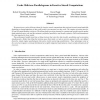1816 search results - page 4 / 364 » Trace oblivious computation |
CRYPTO
1990
Springer
14 years 1 months ago
1990
Springer
This paper describes a method for n players, a majority of which may be faulty, to compute correctly, privately, and fairly any computable function f(Xl, ...,x,) where xi is the i...
CRYPTO
2007
Springer
14 years 1 months ago
2007
Springer
Oblivious transfer (OT) is an essential building block for secure multiparty computation when there is no honest majority. In this setting, current protocols for n 3 parties requ...
ICS
2010
Tsinghua U.
14 years 2 months ago
2010
Tsinghua U.
We present a new cache oblivious scheme for iterative stencil computations that performs beyond system bandwidth limitations as though gigabytes of data could reside in an enormou...
JIPS
2007
13 years 9 months ago
2007
: We propose several practical SMC protocols for privacy-preserving cooperative scientific computations. We consider two important scientific computations which involve linear equa...
TCC
2004
Springer
14 years 3 months ago
2004
Springer
Quantum 2-party cryptography differs from its classical counterpart in at least one important way: Given blak-box access to a perfect commitment scheme there exists a secure 1−2...

